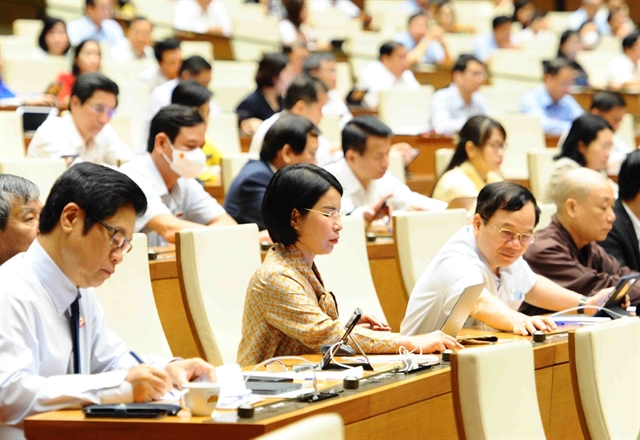
HÀ NỘI — With 91.16 per cent in approval votes, the National Assembly yesterday passed the Law on Mobile Police.
The law, with five chapters and 33 articles, regulates the role, position, duties, powers, responsibilities and obligations, organisation and operation of the mobile police.
The law also regulates policies such as funding, facilities, equipment, application of scientific and technology for the activities of the mobile police force and State management and responsibilities of agencies, organisations and individuals to them.
It stipulates seven task groups of the mobile police, which inherits five provisions in the Mobile Police Ordinance.
Under the law, mobile police forces are allowed to bring weapons, supporting equipment and other professional technical devices onto airplanes to perform their duties in cases of counter-terrorism, hostage rescue, to repress those who commit dangerous acts with weapons; protect the transport of special goods, escort the accused and defendants of serious crimes, and use aircraft mobilised by the competent authorities for the mobile police to promptly handle security and order problems.
Another added task for mobile police force is to stop and disable unmanned aerial vehicles and the scope of these actions.
In addition, the mobile police are also assigned to protect the safety of important political, economic, diplomatic, scientific-technical and cultural objectives as well as important conferences and events.
The law will take effect from January 1, 2023.
Following the vote, legislators discussed the draft Law on Implementation of Democracy at Grassroots Level at its ongoing third session yesterday.
The bill comprises seven chapters and 74 articles, adding many new contents to existing regulations in the field, including those on the implementation of democracy in agencies.
National Assembly deputies agreed on the necessity of promulgating this important law and also discussed improving the quality, uniformity, and ensuring the consistency and feasibility of the provisions of this draft law with other laws.
The draft law has new contents which stipulate the rights and obligations of citizens, cadres, civil servants, public employees and employees in the implementation of grassroots democracy.
Under the draft, people have the right to complain, initiate lawsuits and denounce violations relating to the implementation of democracy at the grassroots levels. People have the obligation to propose and report to competent authorities when detecting violations in its implementation.
Minister of Home Affairs Phạm Thị Thanh Trà said the draft law was developed to institutionalise the motto “People know, people discuss, people do, and people monitor”.
The law also aims to resolve the relationship between implementing democracy and strengthening the rule of law and ensuring social discipline, she said.
And democracy must be associated with people’s lives to promote socio-economic development and ensure national defence and security.
The delegates also raised difficulties in implementing democracy in enterprises when the law stipulates that employees are allowed to give opinions, discuss, decide and check.
More detailed regulations on democracy in enterprises were also needed, they said.
This is also a law related to many current laws, so it is necessary to ensure consistency, synchronisation, science, feasibility, and accessibility, the minister of Home Affairs said.
Also yesterday, the NA was scheduled to opine on the draft revised Law on Domestic Violence Prevention and Control. The amendments aim to improve regulations so as to better protect human rights under the 2013 Constitution, enhance the efficiency and effectiveness of State and social institutions as well as families’ role in this issue, thereby upholding sound traditional cultural values and boosting socio-economic development in the new context.
Consisting of six chapters with 62 articles, the draft revised law focuses on measures to prevent domestic violence, and protect and assist victims; create coordination mechanisms and conditions for implementing domestic violence prevention and control; and encourage the socialisation in this field. VNS
- Reduce Hair Loss with PURA D’OR Gold Label Shampoo
- Castor Oil Has Made a “Huge” Difference With Hair and Brow Growth
- Excessive hair loss in men: Signs of illness that cannot be subjective
- Dịch Vụ SEO Website ở Los Angeles, CA: đưa trang web doanh nghiệp bạn lên top Google
- Nails Salon Sierra Madre
 VnExpress News The News Gateway of Vietnam
VnExpress News The News Gateway of Vietnam




